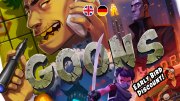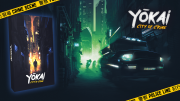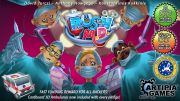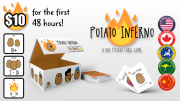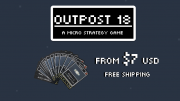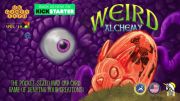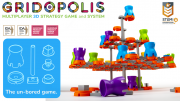Goons (All Or None Games) – Players are henchman, trying to get in on jobs with villains and crooks. Each of the four corners of the board is color-coded, and each has a villain and villain scheme, and an action. In the center of the board is a grid of color cubes, the colors matching the four different corners as well as the color black. The cubes are placed in a random order on the grid. The game takes place over three rounds, with each round lasting a certain number of turns. On your turn you take one of the cubes from the central grid. The cube you take must be from one of the four corners or adjacent to an empty space in the grid. When you take a cube you place it on a colored space on your player card. This gives you two actions: the action that is associated with the color of the cube you took, and the action associated with the color that you placed it on. An action is either the specific action on that corner of the board, or placing influence on the villain on that corner of the board. At the end of the round, villain schemes award points in different ways to the players with the most influence on their scheme.
Casual Games on Kickstarter: Goons, Doctors, and Robinson Crusoe

This month’s Kickstarter games allow players to step into the shoes of time strapped doctors, working together to beat the clock and tend to all patients in time, henchmen vying to get hired for villainous schemes and earn influence, and even Robinson Crusoe, looking for a way off his island. There’s also a nice selection of several quick-playing, easy to learn card games.
Yokai: City of Crime (Hex) – Players are competing to be crime leaders, and the player with the most reputation points at the end of the game wins. The city is created by laying out a series of tiles in random order. Each round there are four phases. The first phase, a city card is drawn, which places tokens around the city such as crime, tip-off, and credits. Next comes the action phase during which each player secretly selects an action and reveals it at the same time. Players will do this twice each round. Actions include moving from one tile to another (in which case you place a crime token on your new tile), increase the crime tokens on your tile or an adjacent tile, add a tip off token to any district, or use your current tile's ability. During the third phase of the round, the police move to the tile with the most tip off and crime tokens and any player pawn present on that tile is moved to the prison tile. During the fourth phase, all tip off tokens are removed from the board, and each player earns reputation points for the crime tokens present on their location, or sharing them if there is another player present on that tile. Credits are also distributed to players present on tiles with them (some tile actions require credits to activate).
Rush M.D. (Artipia Games) – A real time cooperative board game, with some dexterity elements, Rush M.D. takes place over four rounds which are four minutes each. Players are doctors, and each player has a doctor sand timer which they assign around the board to perform actions. Players additionally have four nurse sand timers which they can use jointly. Once a sand timer is placed, it cannot be moved until all the sand has run out, so players need to be careful before they commit a timer. How you use your limited time, is where the challenge rests.
Robinson Crusoe, Escape From Despair Island (Old Novel Games) – Each player is dealt five cards face down. This represents their food supply. During each player's turn there are two phases: exploration and market. During exploration, the active player may flip up to ten cards, looking for food and resources. After choosing to stop (or after flipping your tenth card) you select a card to keep. You can take camp cards which include character cards that improve your abilities, resources, or items to construct. Or you can select a food card, which allows you to draw a certain number of cards from the draw deck and add them facedown to your food pile. If, while flipping cards, you draw two threat cards, you must deal with the greater threat if you wish to select a card. To defeat a threat you must match the icons shown on it with the cards you have in your camp, or else the exploration phase immediately ends. After the exploration phase is the market phase, in which all other players are given the option to buy one of the cards left over from the exploration phase, using food to buy the cards. Players are competing to be the first to escape the island, with three different paths available to choose from.
Potato Inferno! (Haiden Trost) – This light, fast card game features a wide range of colorful potato characters. The deck is shuffled and three cards are dealt to each player. The top card of the draw pile is then flipped to reveal the heat level. Players take turns playing a card and adding to the heat level, before drawing a new card into their hand. So, for example, if the card flipped at the beginning had a value of seven, and you play a five, the new heat level is now thirteen. The heat level can never go over one hundred, so if a player ever only has cards that would take it over that number, she is out of the game. There are also cards that will lower the heat level, allow you to draw more cards, or let you attack opponents.
Outpost 18 (Angry Cyborg Games) – There are only eighteen cards in this two player space battle strategy game. Each card can be used as either an upgrade to your station or as a ship in your fleet. Ships have different attack power and abilities. Upgrading your station provides shields for the station as well as resources that you need in order to use your ships’ special abilities. The goal of the game is to generate enough attack power with your fleet to destroy your opponent’s station and win you the game.
Weird Alchemy (Daniel Gorin) – The deck is shuffled and three cards are dealt to each player. On your turn you can play a pass card to pass monster cards to other players (the pass card determines which direction you pass in), then you draw a card into your hand and your turn ends. When an accident card is drawn, players lay all their cards on the table. Any monster cards in their hand go into their personal pile. Players may then play any magic cards they have. Any remaining cards are then taken back into their hands and the game continues. Play continues until the fifth and final accident card is drawn and resolved, then the game ends and scores calculated. Players earn two points for any monster cards in their personal pile (though a complete set of monsters is worth zero points) and one point for every two cards in their hand. The winner is the player with the fewest points.
Gridopolis (SchultzeWORKS) – Gridopolis is a 3D strategy game and game system, with a modular board that allows players to create different play areas based on preference, player count, and game mode. The game system comes with one set of game rules, though more are being designed and players are also encouraged to come up with their own games and rules. You can read our review of Gridopolis here.
Disclosure: unless otherwise noted, we have not seen or played any of the above games. Our assessment of each is based on the information given on the crowdfunding project page.




